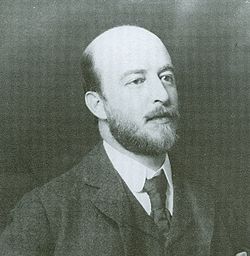James Wilson Morrice
James Wilson Morrice | |
|---|---|
 | |
| Born | August 10, 1865 Montreal, Quebec, Canada |
| Died | January 23, 1924 (aged 58) |
| Nationality | Canadian |
| Education | Académie Julian |
| Known for | Painting |
Notable work | Prow of a Gondola, Venice |
| Movement | Post Impressionism |
James Wilson Morrice RCA (August 10, 1865 – January 23, 1924) was a significant Canadian landscape painter. He studied at the Académie Julian[1] in Paris, France, where he lived for most of his career. James Morrice Street in New Bordeaux, Ahuntsic-Cartierville, Montreal is named in his memory.
Biography[]
Morrice was born in Montreal, Quebec, the son of a wealthy merchant, and studied law in Toronto from 1882 to 1889. In 1890 he left to study painting in England. The next year he arrived in Paris, where he studied at the Académie Julian from 1892 to 1897. At the Académie Julian, he befriended Charles Conder and Maurice Prendergast, and also met Robert Henri.
Morrice continued to live in Paris until the First World War, although he spent most of his winters in Canada. He made many connections in the intellectual circles of Paris, while also remaining in touch with the Canadian art world:
- joined the Salon d'Automne, 1905
- joined the Canadian Art Club, 1907
- elected member of the Royal Canadian Academy, 1913
During this period he was also in contact with the literary milieu, with English expatriate intellectuals living in Paris, such as W. Somerset Maugham, Arnold Bennett, and Clive Bell. In the winter of 1911-12 he shared a studio with Matisse in Tangiers.
With the advent of World War I, Morrice fled to Montreal, and then to Cuba. There he began to succumb to alcoholism. The output of his last period is uneven and infrequent. In the summer of 1922 he travelled to Algiers, where he painted with Albert Marquet. This would be the last time that he painted, as his health began to rapidly deteriorate. He died, aged 58, in Tunis.
Gallery[]
Morrice's paintings before the turn of the century are thinly painted and inspired by Whistler, both in sentiment and in treatment of colour. Just prior to World War I he began to paint, in a thicker style, winter Canadian scenes influenced by the Impressionists. Some of his works during his Caribbean period are considered his best and are painted in a loose style influenced by Post Impressionism.
- Prow of a Gondola, Venice, 1897 National Gallery of Canada
- Return from School, 1901
- Quai des Grands-Augustins, 1903. The National Gallery of Canada
- The Ferry, Quebec, 1906. NGC
- Blanche Baume, 1912. NGC
- House in Santiago, 1915 Tate Gallery
- Village Street, West Indies, 1919. Montreal Museum of Fine Arts

Paris Canal 1900 Musée d'art contemporain de Montréal

Venice c. 1900

Dieppe, 1906

Street Scene Pink Sky Paris c. 1908 Art Gallery of Ontario

Old Holton House, Montreal, 1908-09 Musée des beaux-arts de Montréal

Venice, c. 1910

The Ferry, Quebec c. 1910

Blanche Baume, Oil on canvas, 1911–12, National Gallery of Canada
Recognition[]
In 1958, works by Morrice along with those of Jacques de Tonnancour, Anne Kahane and Jack Nichols represented Canada at the Venice Biennale.[2]
References[]
- ^ biographi.ca
- ^ "Past Canadian Exhibitions". National Gallery of Canada at the Venice Biennale. National Gallery of Canada. Archived from the original on October 13, 2013. Retrieved October 12, 2013.
Further reading[]
- Reid, Dennis (1988). A Concise History of Canadian Painting, Second Edition. Don Mills: Oxford University Press Canada. ISBN 0-19-540663-X.
- Ash K. Prakash: Impressionism in Canada. A Journey of Rediscovery. Pref. Guy Wildenstein, introd. William H Gerdts. Arnoldsche Verlagsanstalt, Stuttgart 2014, 2. Aufl. 2015 (illustr. book, with expl. One chapter on James Wilson Morrice. Figure Sainte-Anne-de-Beaupré from 1897 on the publishers page)
External links[]
- 1865 births
- 1924 deaths
- Alumni of the Académie Julian
- Artists from Montreal
- Canadian male painters
- Canadian landscape painters
- Members of the Royal Canadian Academy of Arts
- Persons of National Historic Significance (Canada)
- 19th-century Canadian painters
- 20th-century Canadian painters








